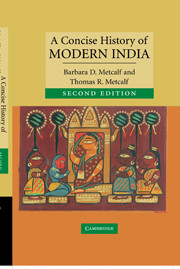Book contents
- Frontmatter
- Contents
- List of illustrations
- Preface to the second edition
- Preface to the first edition
- Glossary
- Chronology
- 1 Sultans, Mughals, and pre-colonial Indian society
- 2 Mughal twilight: the emergence of regional states and the East India Company
- 3 The East India Company Raj, 1772–1850
- 4 Revolt, the modern state, and colonized subjects, 1848–1885
- 5 Civil society, colonial constraints, 1885–1919
- 6 The crisis of the colonial order, 1919–1939
- 7 The 1940s: triumph and tragedy
- 8 Congress Raj: democracy and development, 1950–1989
- 9 Democratic India in the nineties: coalitions, class, community, consumers, and conflict
- Epilogue: a new century begins
- Biographical notes
- Bibliographic essay
- Index
- CAMBRIDGE CONCISE HISTORIES
5 - Civil society, colonial constraints, 1885–1919
Published online by Cambridge University Press: 05 June 2012
- Frontmatter
- Contents
- List of illustrations
- Preface to the second edition
- Preface to the first edition
- Glossary
- Chronology
- 1 Sultans, Mughals, and pre-colonial Indian society
- 2 Mughal twilight: the emergence of regional states and the East India Company
- 3 The East India Company Raj, 1772–1850
- 4 Revolt, the modern state, and colonized subjects, 1848–1885
- 5 Civil society, colonial constraints, 1885–1919
- 6 The crisis of the colonial order, 1919–1939
- 7 The 1940s: triumph and tragedy
- 8 Congress Raj: democracy and development, 1950–1989
- 9 Democratic India in the nineties: coalitions, class, community, consumers, and conflict
- Epilogue: a new century begins
- Biographical notes
- Bibliographic essay
- Index
- CAMBRIDGE CONCISE HISTORIES
Summary
The decades that spanned the turn of the twentieth century marked the apogee of the British imperial system, whose institutional framework had been set after 1857. At the same time, these decades were marked by a rich profusion and elaboration of voluntary organizations; a surge in publication of newspapers, pamphlets and posters; and the writing of fiction and poetry as well as political, philosophical, and historical non-fiction. With this activity, a new level of public life emerged, ranging from meetings and processions to politicized street theatre, riots, and terrorism. The vernacular languages, patronized by the government, took new shape as they were used for new purposes, and they became more sharply distinguished by the development of standardized norms. The new social solidarities forged by these activities, the institutional experience they provided, and the redefinitions of cultural values they embodied were all formative for the remainder of the colonial era, and beyond.
Yet it was only to be in the 1920s that the British began to recognize the hollowness of their long-held assumption that self-rule for India would be pushed off into an indefinite future. The viceroys who presided over the final decades of the century – Dufferin (1884–8), Lansdowne (1888–94), and Elgin (1894–9) – were, in Percival Spear's phrase, ‘imperial handymen’ all. Unshaken by the fissures revealed in the Ilbert Bill controversy and imagining a future like the past, they endeavoured to secure the economic interests of empire, establish secure borders, and provide a government of limited responsibilities.
- Type
- Chapter
- Information
- A Concise History of Modern India , pp. 123 - 166Publisher: Cambridge University PressPrint publication year: 2006

